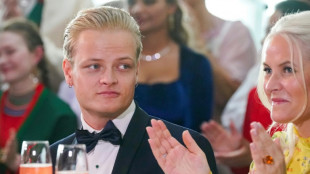
-
 Japanese, Koreans bottom of global love life survey
Japanese, Koreans bottom of global love life survey
-
Japan ramps up tech ambitions with $65 bn for AI, chips

-
 Taliban govt clearing 'un-Islamic' books from Afghanistan shelves
Taliban govt clearing 'un-Islamic' books from Afghanistan shelves
-
Asian markets struggle as traders weigh geopolitical tensions

-
 Iraq holds its first census in nearly 40 years
Iraq holds its first census in nearly 40 years
-
SpaceX fails to repeat Starship booster catch, as Trump watches on

-
 European powers, US seek to censure Iran at UN nuclear watchdog board
European powers, US seek to censure Iran at UN nuclear watchdog board
-
SpaceX fails to repeat Starship booster catch, as Trump looks on

-
 European stocks fall on Ukraine-Russia fears, US focused on earnings
European stocks fall on Ukraine-Russia fears, US focused on earnings
-
Trump names China hawk Howard Lutnick commerce secretary

-
 SpaceX set for Starship's next flight -- with Trump watching
SpaceX set for Starship's next flight -- with Trump watching
-
Top-selling daily French daily Ouest-France stops posting on X

-
 Russian invasion toll on environment $71 billion, Ukraine says
Russian invasion toll on environment $71 billion, Ukraine says
-
New Botswana leader eyes cannabis, sunshine to lift economy

-
 China's Xi urges 'strategic' ties in talks with Germany's Scholz
China's Xi urges 'strategic' ties in talks with Germany's Scholz
-
COP29 negotiators strive for deal after G20 'marching orders'

-
 Walmart lifts full-year forecast after strong Q3
Walmart lifts full-year forecast after strong Q3
-
Son of Norwegian princess arrested on suspicion of rape

-
 US lawmaker accuses Azerbaijan in near 'assault' at COP29
US lawmaker accuses Azerbaijan in near 'assault' at COP29
-
Spain royals to visit flood epicentre after chaotic trip: media

-
 French farmers step up protests against EU-Mercosur deal
French farmers step up protests against EU-Mercosur deal
-
Burst dike leaves Filipino farmers under water

-
 Markets rally after US bounce as Nvidia comes into focus
Markets rally after US bounce as Nvidia comes into focus
-
Crisis-hit Thyssenkrupp books another hefty annual loss

-
 Farmers descend on London to overturn inheritance tax change
Farmers descend on London to overturn inheritance tax change
-
Floods strike thousands of houses in northern Philippines

-
 SpaceX set for Starship's next flight, Trump expected to attend
SpaceX set for Starship's next flight, Trump expected to attend
-
Several children injured in car crash at central China school

-
 Urban mosquito sparks malaria surge in East Africa
Urban mosquito sparks malaria surge in East Africa
-
Many children injured after car crashes at central China school: state media

-
 Asian markets rally after US bounce as Nvidia comes into focus
Asian markets rally after US bounce as Nvidia comes into focus
-
Tens of thousands march in New Zealand Maori rights protest

-
 Five takeaways from the G20 summit in Rio
Five takeaways from the G20 summit in Rio
-
Parts of Great Barrier Reef suffer highest coral mortality on record

-
 Defiant Lebanese harvest olives in the shadow of war
Defiant Lebanese harvest olives in the shadow of war
-
Divided G20 fails to agree on climate, Ukraine

-
 Can the Trump-Musk 'bromance' last?
Can the Trump-Musk 'bromance' last?
-
US to call for Google to sell Chrome browser: report

-
 Trump expected to attend next Starship rocket launch: reports
Trump expected to attend next Starship rocket launch: reports
-
Stocks, dollar hesitant as traders brace for Nvidia earnings

-
 Biden in 'historic' pledge for poor nations ahead of Trump return
Biden in 'historic' pledge for poor nations ahead of Trump return
-
Tropical storm Sara kills four in Honduras and Nicaragua

-
 Spanish resort to ban new holiday flats in 43 neighbourhoods
Spanish resort to ban new holiday flats in 43 neighbourhoods
-
Phone documentary details Afghan women's struggle under Taliban govt

-
 G20 wrestles with wars, 'turbulence' in run-up to Trump
G20 wrestles with wars, 'turbulence' in run-up to Trump
-
Stocks, dollar hesitant as traders eye US rate outlook, Nvidia

-
 G20 wrestles with wars, climate in run-up to Trump
G20 wrestles with wars, climate in run-up to Trump
-
G20 host Brazil launches alliance to end 'scourge' of hunger

-
 Stocks, dollar hesitant as traders scale back US rate cut bets
Stocks, dollar hesitant as traders scale back US rate cut bets
-
Trump confirms plan to use military for mass deportation


Right-wing 'Schnitzel bonus' rewards 'traditional' Austrian eateries
Staples of Austrian cooking such as schnitzel, roast pork lung and boiled beef have proved particularly vital for Gasthaus Stich, a restaurant in the village of Pfoesing.
They have helped the struggling business to survive by earning it a subsidy from right-wing state authorities in a controversial programme that benefits only traditional Austrian cuisine.
The subsidy for restaurants that serve regional and "traditional food" has been derided in the media and by opposition parties as a "Schnitzel bonus".
It excludes restaurants serving less overtly authentic Austrian fare such as kebabs or pizza, for example.
As a typical Austrian staple, schnitzel -- a boneless piece of meat that has been pounded thin to make it more tender and then coated and fried -- qualifies for the cash.
"They gave us 10,000 euros," or $11,000, said Michael Stich, the 39-year-old owner of the family business in Pfoesing, population 300, in the state of Lower Austria.
The village's last surviving restaurant is an institution, "like the church, town hall or fire station", he told AFP.
"If this place didn't exist, it would be difficult for the entire community."
Austria's conservative Chancellor Karl Nehammer has said he wants to defend the country's "Leitkultur," or "dominant culture", as he seeks to bolster support ahead of September elections.
Campaigning on an anti-immigration platform, he has evoked the concept, born in Germany in the 1990s, as polls indicate the far right will come out on top for the first time in the Alpine nation.
- 'Discriminatory' -
Lower Austria -- governed by the conservatives together with the far right -- introduced the "Schnitzel bonus" this year for owners who open a restaurant in a town without one or take over an existing one.
"The subsidy was very important for us," said Michael Stich's father, Hermann Stich, 62.
He continues to help out after his son became the third generation to run the business at the beginning of the year.
As he taps beer served over a large wooden counter, he notes the impact of energy and labour costs that are hurting the restaurant, which sports hunting antlers and a crucifix on the walls.
Since 2000, one in three restaurants in the state of Lower Austria, near Vienna, have closed, partly due to a rural exodus, with the coronavirus pandemic and resulting lockdown also taking their toll.
So far, 20 restaurants have received the bonus.
But critics have denounced the measure as discriminatory -- an accusation rejected by the conservative People's Party (OeVP) state parliament member Kurt Hackl.
"Village restaurants in Lower Austria are dying out, and we want to support them," he said, calling them "special".
- 'Our values' -
At Gasthaus Stich -- which also features regional wines and seasonal dishes such as chanterelles with dumplings -- clubs from the community regularly hold their meetings there, and guests play cards on wooden tables.
"In small communities, the tavern is the centre of social life. People celebrate, laugh and cry there together," said Oliver Fritz at the Austrian Institute of Economic Research (WIFO).
However, Fritz considers the 10,000 euro subsidy as just a "drop in the ocean".
He also warns of possible "windfall effects" for restaurant owners who do not really require the support.
He also questioned why restaurants who offer pizza or kebabs should be excluded.
"The social function works even if it is an Italian restaurant," he told AFP.
"If demand evolves and younger generations prefer to eat something else, then it's better to adjust, because countering a trend is extremely difficult," he said.
Meanwhile, at the national level, Nehammer has tasked his integration minister with defining what "Leitkultur" means for the country of nine million people, which like the rest of the EU has seen an influx of migrants and asylum seekers.
Under his "plan for Austria" launched early this year, Nehammer said that "Anyone who wants to live permanently in Austria must represent our values, accept our culture and adapt to our way of life".
T.Morelli--CPN
